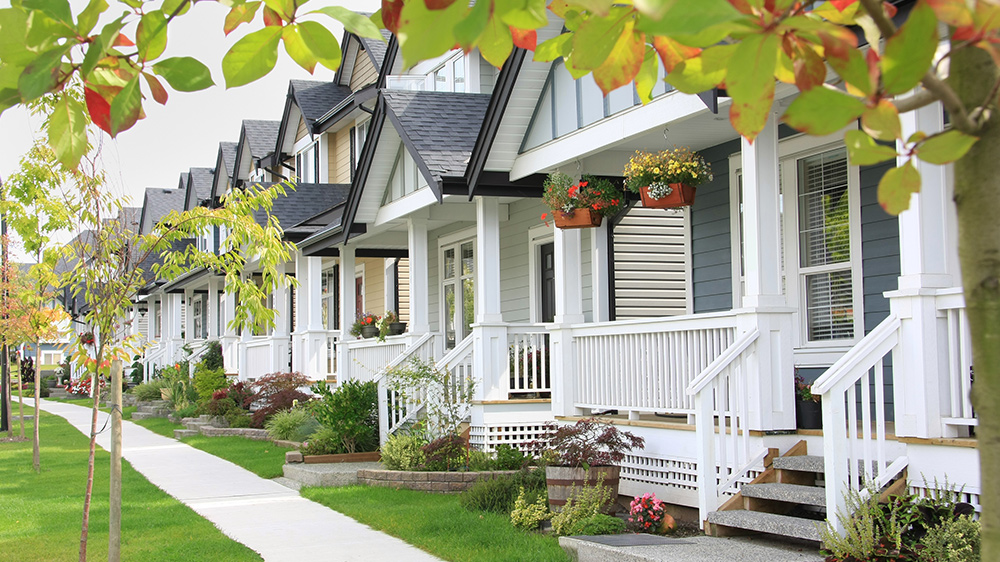Surprise! You might know more about real estate than you think. For example, you know that square footage, number of bedrooms and bathrooms, lot size, and location determine home value: A 4,000-square-foot, five-bed, five-bath beachfront home for sale in Miami, FL, will almost always be worth more than a 2,000-square-foot, two-bed, two-bath home on a quarter-acre lot 20 miles inland.
But those obvious factors aren’t everything you need to calculate your home’s property value estimate. Other, less obvious features can negatively or positively come into play — features you might not have considered. Here are eight frequently overlooked (and not always fixable) things that, for better or for worse, can impact the value of your home.
1. The name of your street (really!)
People typically prefer the street they live on to have a name versus a number. It’s true nationwide (with the exceptions of New York, NY, and Atlanta, GA, where there is no difference, and Denver, CO, where numbers are favored). According to a study by Trulia, “street” is the least expensive address suffix by price per square foot, and “boulevard” is the most expensive.
2. Your house number
Ever heard of house numerology? This is the practice of assigning a single-digit number to your home based on its address. Let’s say your address is 1219 Main St. Add 1 + 2 + 1 + 9 to get 13. Then add 1 + 3. Your house would be 4: good for investments and security but bad for adventure and excitement. While this type of house numerology may be passed off as a superstition, buyers who subscribe to this theory may overlook potential homes because of their numerology calculations. However, whether or not you’re into numerology, house numbers do matter. If your address is 13 (a universally unlucky number), you might choose to price your home slightly less than your neighbor at number 12 did.
3. Sketchy neighbors
The closer you live to your neighbor, the more important it will be for your tastes, habits, and personalities to jibe with theirs. “In a condo, the last thing a potential buyer wants is to purchase a unit where the neighbors above are noisy or inconsiderate,” says Thomas Miller, who specializes in Washington, DC, real estate. Owners of single-family homes can thank fastidious neighbors with good taste to increase the values of all nearby homes. But, of course, the opposite is also true: “I know a homeowner who had great difficulty selling their home because their next-door neighbors constructed a giant memorial dedicated to Michael Jackson on the front lawn,” says Miller. The next time you want to complain about your homeowners’ association, picture that image.
4. Mature trees
Tree-huggers and environmentalists unite! It’s common practice for developers to cut down most of (or all!) the trees on a property to build homes. But mature trees almost always enhance property values. Still don’t believe it? Check out the National Tree Benefit Calculator to see the full benefits of planting specific types of trees. If you have the space, make a trip to your local nursery to discuss the best tree options for your home.
5. Crown moldings
If you’ve worked hard to select just the right neutral and serene paint color scheme that will probably attract the most buyers, you’re doing yourself a disservice if you neglect one important element: crown moldings. “People love crown moldings,” says Alexander Boriskin, a New York, NY, agent. “Of course, everyone loves high ceilings too,” he says. Although you can’t do anything about how high your ceilings are, you can put in crown moldings — even with lower ceilings. Just make sure they work with the scale of the room, and don’t veer too far into the trend zone.
6. Yankees paraphernalia
Yankees fans, relax. We’re not picking on just you. Although this anecdote from New Jersey real estate agent Kevin Lawton happens to be about the New York baseball team, you could insert any team here. “Everything in the home was Yankees,” he says. “[The sellers] even had carpeting in the family room that had baseballs on it.” The verdict? Many people were turned off, especially Red Sox fans. If you don’t want to alienate a potential buyer, you might want to stash the fan gear away while your home is on the market.
7. Starbucks
And Trader Joe’s and Whole Foods. If you have any of those establishments close by, typically within a mile, up goes your property’s value. “Homes near Trader Joe’s have increased in value by an average of 40% since purchased,” says Chris Leavitt, a South Florida and New York, NY, agent and past star of the TV series Million Dollar Listing Miami. “Nearby Starbucks and Whole Foods Markets also enjoyed double-digit gains on home value.”
8. A death on the property
In some states, such as California, sellers must disclose whether there was a death on the property, which can be a deal breaker for some buyers. California agent Tracey Hampson once showed a home where a fatal drug overdose had occurred in the master bedroom. “On average, once the buyers found out there had been a death on the property, two out of five buyers that were interested suddenly said, ‘Thanks, but no thanks.’”
There’s even a name for a home someone died in: stigmatized. “It refers to a home that has been the site of a murder, suicide, or paranormal activity or haunting,” says Michigan agent Kelly Jo Choate. But even if your state doesn’t have a death disclosure requirement, certainly if someone asks, you should fess up. It’s the right thing to do.
By: Laura Agadoni / September 2016
